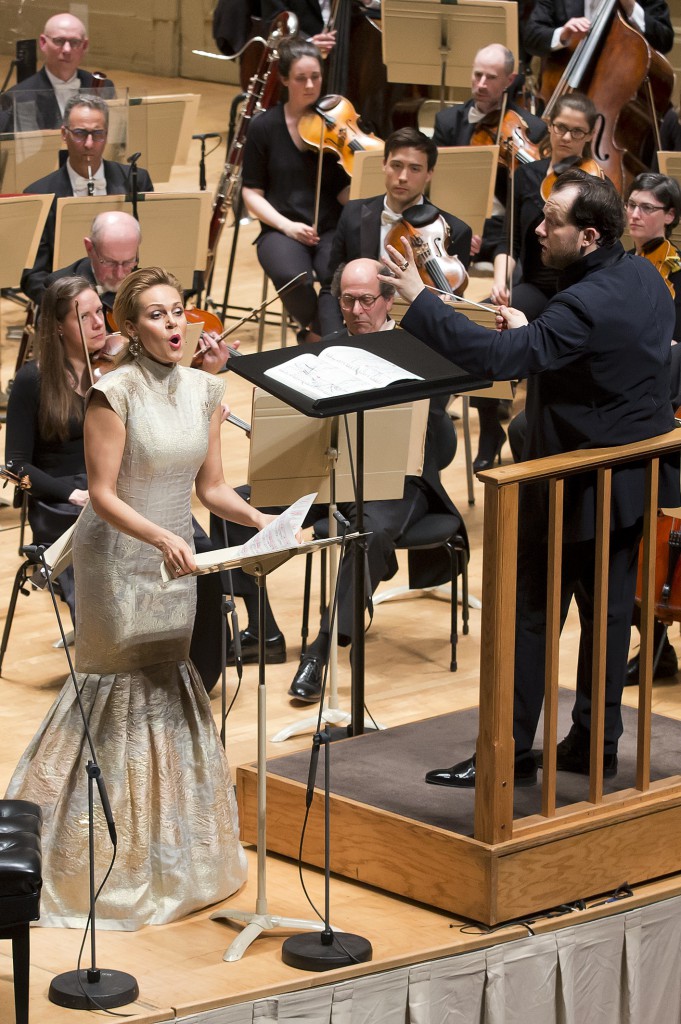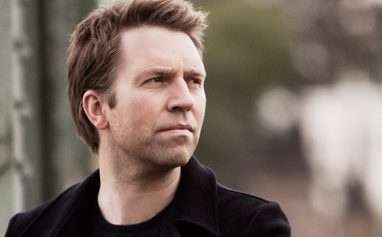Nelsons wraps BSO season with Mahler, Rachmaninoff

Kristine Opolais performs in Mahler’s Symphony No. 4 with Andris Nelsons and the Boston Symphony Orchestra Thursday night at Symphony Hall. Photo: Winslow Townson
By 1920, Sergei Rachmaninoff found himself without a country and without a direction.
The Bolshevik Revolution of 1917 prevented him from returning to Russia. Needing money, he abandoned composition for a time to make a living as a concert pianist, touring Europe and the United States with his own piano concertos. When he returned to composition he found that his sweeping romantic style was no longer the current of the day. Looking to be more relevant, he studied the music of Scriabin and heard the works of Stravinsky, Bartók, Schoenberg, and Gershwin.
Hints of those influences can be heard in his Fourth Piano Concerto, which he worked on for ten years and completed in 1926. Casting themes that are crisp and nimble into orchestration that is thick and colorful, the piece stands apart from his more familiar works for piano and orchestra.
The concerto made for a bold conclusion to the Boston Symphony Orchestra’s season Thursday night at Symphony Hall, where pianist Leif Ove Andsnes offered a bristling and rousing rendition of the score. Andris Nelsons led the way.
Andsnes has a wide repertoire that stretches from Haydn to Nielsen. Recent recording projects have resulted in the complete Beethoven piano concertos with the Mahler Chamber Orchestra. Rachmaninoff is also a specialty of his and he has recorded all of the composer’s concertos for the EMI label.
The Norwegian pianist possesses a firm technique, and he brought a bright, singing tone to the opening chords of the work. He handled the cascading figures that pepper the first movement with stinging clarity and precision. The clipped, jazzy themes of the third movement were similarly crisp and athletic.
This concerto, however, doesn’t have the power and intensity of Rachmaninoff’s other works in the genre. While it contains difficult passagework, the themes don’t always have a clear direction, and the second movement lacks a satisfying melodic sweep.
But Andsnes played the movement as if it were one of the finest pieces in the repertoire. He brought a bluesy touch to the songlike opening phrases. Elsewhere, his playing was searching, the passages erupting into powerful climaxes. Nelsons led an accompaniment finely tuned to the details of the orchestration, coaxing soft woodwind lines that floated over Andsnes’ figures.
The concert opened with excerpts from Shostakovich’s incidental music to King Lear, which the BSO will release as part of its survey of the composer’s symphonies.
The movements of this score are chock-full of colorful orchestration, and Nelsons led a performance of precision and excitement. The brasses in the fanfares were full and fiery, and elsewhere the music twisted with a the composer’s characteristic dark wit, not least the impish bassoon lines. William R. Hudgins’ clarinet solo sounded with sweet sadness in “Cordelia’s Ballad.”
Mahler’s Fourth Symphony made up the second half of the program, revealing moments of graceful musicality and surging intensity. Scherzo movements in the composer’s symphonies are imbued with a dance-like grace. But there is also a wry humor embedded into the score, and Nelsons found a stirring energy well attuned to those traits. Solo phrases were crafted in bold colors, and the music glided as if on a breeze.
The other movements were beautiful. The first movement was a scene of jollity, with cello passages sounding bright and woodwinds supplying just the right touch of bucolic verve. The third movement flowed in phrases of thin silver. Bass lines were felt more than heard, and the harp supplied a fine golden touch to those figures later in the movement. When the opening theme returned, it took on a distant glow.
The finale offers a child’s view of heaven through text taken from Des Knaben Wunderhorn. The soloist was soprano Kristine Opolais, who, singing from a score, brought a light, nimble voice to the music. The opening section had a slight darkness to the sound, which added, perhaps, the weight of earthly pleasures. “Kein Musik ist ja nicht auf Erden” floated tenderly. The BSO strings added a halo of effects to the closing phrases that brought the evening and season to a warm conclusion.
The program will be repeated 1:30 p.m. Friday and 8 p.m. Saturday at Symphony Hall.bso.org; 888-266-1200.
Posted in Performances





